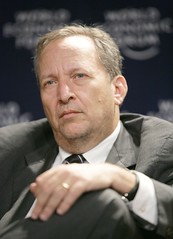Again with the caveat that I haven’t really caught up yet with the transition news of the last week, the confirmations from before surely mean that there’s one man who must not be happy. On the day after Obama’s victory, Dissent‘s Mark Engler celebrated:
Obama rose to the top of a Democratic pool that, as a whole, positioned itself notably to the left of what we had come to expect in the Clinton-Gore years, when top officials scrambled to prove their pro-corporate bona fides and to declare their allegiance to the Democratic Leadership Council. Today’s contenders, while far from perfect from a progressive perspective, campaigned as opponents of an unjust war and of faulty trade agreements such as NAFTA, as advocates of pro-worker labor law reform and of serious national health care.
But he already warned:
To be sure, the .. more contemporary fight to thwart the rightward-pushing forces within the Democratic Party .. is not over. The likes of Robert Rubin and Larry Summers hover over Obama’s victory.
I bet he didn’t realise just how much they’d “hover”. With the appointments of Geithner, Summers and Orszag, I’m guessing Engler must have gotten a lot more worried still. As Ezra Klein noted:
For critics of so-called Rubinomics, [..] watching Rubin’s proteges step into every major economic staffing position in the new administration has been concerning. Watching them do so as Goldman-Sachs, which Rubin once led, and Citigroup, which Rubin recently advised, get buffeted by the subprime collapse is almost perverse.
To be fair, however, the opposition within the Democratic Party between the neoliberal, Rubinite cheerleaders of deregulation and the progressive sceptics of free market solutions no longer has the bitter edge it had in the 90s. And the main reason for that is that experience has taught Summers et al. to be more sceptical themselves.
Consider what The American Prospect’s Robert Kuttner, himself a progressive critic of Rubinomics, wrote about Geithner last September:
Continue Reading »




